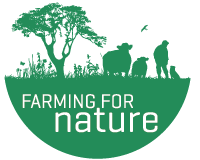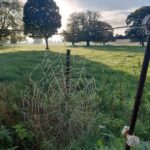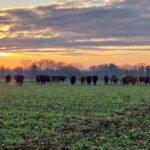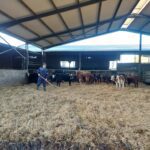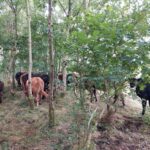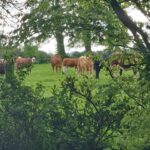Ken Gill
Ken Gill is an organic beef farmer near Edenderry Co. Offaly. He keeps around 60-70 suckler cows and finishes animals at 2 years, which are all completely grass-fed.
Prior to 2015, he was farming conventionally but struggling to make it work financially. He tried organics and has been impressed with the results ‘'The grazing ground gets very little fertiliser, it’s amazing. Soil tests a few years after going organic showed P & K levels had improved rather than declined'.
He has been carefully managing soil fertility since, ensuring no ground is left bare and catching and using effluent that runs off the yard. In his rotation, he produces turnip, kale and rape for fodder, which also has the benefit of breaking up the soil for subsequent crops. He produces around 8 hectares (20 ac) of oats for Flahavan’s, and then introduces red clover for fertility.
He is a part of the Teagasc Future Beef group. In 2023, group members reported very poor grass growth. In contrast, he notes in ‘our system the weather didn’t make much difference, it was more resilient compared to the other Future Beef farmers - the financial figures are more than holding their own’.
He used to keep a ‘short, back and sides’ approach to hedgerow management but now lets them grow. He uses a knife bar hedge cutter for trimming behind electric fences, which he finds helps the quality of the hedge. He has observed how the hedge provides a shelter not just for cattle but for grass too ‘you can see it after a cold east wind for a couple of weeks, there is a big difference between the exposed field and the sheltered fields.’ This is just one example on his farm of 'how helping nature helps your bottom line too'. As a result, under the ACRES scheme, he planted 500m of hedging .
NOMINATOR: Hannah Denniston, Department of Agriculture, Food and the Marine
NOMINATION:
Ken Gill is a full-time organic farmer operating a suckler to beef system on his 95 hectare farm. The farm has been in the family for three generations and is coming up to the 100th year anniversary since his grandfather purchased the farm.
Ken is strong believer in space for nature and that this does not have to compromise commercial viability. Ken has always farmed with this approach and the abundance and quality of habitats on the farm reflect this.
The farm converted to organic production in 2013. It has a herd of 65 / 70 suckler cows plus followers. Being organic means that crop rotation is important to the system for soil health and weed control. Oats, red clover swards and winter fodder crops provide a variety of habitats and food sources in the system.
The farm has 14Ha of beautiful semi-natural woodland which was planted 25 years ago and managed to provide continuous cover. A further 5Ha of semi-natural woodland has been under planted with oak in 2000 and is now starting to regenerate with an understory of native species. Large mature trees and healthy hedgerows throughout the farm provide an abundance of food and shelter resources for wildlife. Ken is a great advocate for the importance of hedgerow management and the huge difference that wildlife sensitive management can make. The hedgerows are cut in rotation every 2 – 3 years and allowed to flower. The margins are fenced and being organic are free from pesticides and herbicides providing additional resource rich habitat.
The farm is a survey site for the National Pilot Pollinator Monitoring Scheme facilitating 5 survey visits over the summer months. Ken speaks very highly of the survey team and has enjoyed learning about pollinators and especially the importance of providing the pollinator friendly habitats. He has gained a strong an appreciation, in particular, for the value of field margins and for the positive impact of management choices he has made. The margins, bases of hedgerows and earth banks are all free from pesticides and provide great natural nesting sites for pollinators.
Ken’s farm provides a great example of a successful farm that also allows nature to thrive alongside agriculture.
